|
|
|
Sort Order |
|
|
|
Items / Page
|
|
|
|
|
|
|
| Srl | Item |
| 1 |
ID:
128213
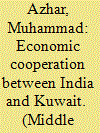

|
|
|
|
|
| Publication |
2014.
|
| Summary/Abstract |
Over two decades of liberalization and reforms have resulted in India becoming the second fastest growing economy in the world. Having the second largest population in the world, it is also a vast repository of skilled manpower. However, the significant growth in Indian economy has increased the demand for energy substantially. Consequently, India has to import 80 per cent of its petroleum crude requirement. In contrast to India, Kuwait is very small in size and population. But it is very rich in hydrocarbon resources. The economic cooperation between India and Kuwait is deep rooted. It consists of bilateral trade inclusive of energy imports, Indian expatriate workers in Kuwait and the inflow of remittances, Kuwaiti aid and prospective Kuwaiti investments. The article is a detailed study of all these aspects of economic cooperation between the two countries.
|
|
|
|
|
|
|
|
|
|
|
|
|
|
|
|
| 2 |
ID:
128216
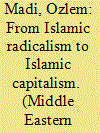

|
|
|
|
|
| Publication |
2014.
|
| Summary/Abstract |
The rise of Turkish Islamic capitalism, and with it an Islamic bourgeoisie and the accompanying lifestyle has profound implications for the Muslim world, since the Turkish Muslims have been backed by a relatively successful democratic and liberal system that has allowed them to integrate more easily into the global system. Focusing mainly on the members of the Islamic-oriented Association of Economic Entrepreneurship and Business Ethics (?G?AD), the aim of this article is to demonstrate the inherent (in)compatibility and contradictions between Islam and capitalism in contemporary Turkey, and by extension in the Muslim world. From the start, for the Turkish Muslim bourgeoisie, the burning questions were 'how to earn' and, more importantly, 'how to consume' within a capitalist system while still not transgressing Islamic boundaries. In order to overcome these challenges, the article argues that, rather than creating an 'alternative Islamic economic system', Islamic actors have reduced - in some cases, even eliminated - this discursive and ideological tension between Islam and capitalism by (a) trying to introduce Islamic morality into capitalism and (b) redefining both Islam and capitalism. Through these mechanisms they have also broadened and deepened Turkish modernity.
|
|
|
|
|
|
|
|
|
|
|
|
|
|
|
|
| 3 |
ID:
128211
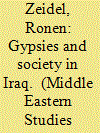

|
|
|
|
|
| Publication |
2014.
|
| Summary/Abstract |
This article focuses on a Gypsy group that lives in Iraq, away from the main concentrations in Europe. Although Gypsies apparently arrived in Mesopotamia around the tenth century, long before many Arab tribes and despite their cultural assimilation into the local culture, Gypsies were not assimilated into the local society, partly because the local society rejected them and partly because they did not want to assimilate. The difference in the attitude of the local society to the Gypsies lies in their perceived 'impurity' and their occupation, dancing and music, in which Gypsy women are employed. Iraqi Gypsies had long suffered from social as well as governmental discrimination: Iraqi citizenship was given to them only in 1979. Unexpectedly, it was the Iraqi dictatorship of Saddam Hussein which improved their status considerably, yet, at the same time, made them dependent on the regime. Consequently, after the fall of the Ba`th regime, Gypsies now face a bleak future. The article gives a concise historical presentation of Gypsy life in twentieth century Iraq and takes a closer look at literary views of the Gypsies, reflecting the limits of liberal attitudes toward them.
|
|
|
|
|
|
|
|
|
|
|
|
|
|
|
|
| 4 |
ID:
128215
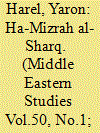

|
|
|
|
|
| Publication |
2014.
|
| Summary/Abstract |
During the span of 22 months stretching from the entry of Fayal b. Husayn into Damascus in October 1918 until his expulsion at the end of July 1920, 42 newspapers and 13 journals appeared in Syria, more than half of them in Damascus. During this time, in which the press had a critical role in expressing and shaping public opinion in Syria, it became clear to the emissaries of the Zionist institutions in Damascus that they, too, needed to turn to this medium in order to spread their message. Hence, they argued that there was a need to publish a newspaper reflecting a moderate and calming outlook that would draw Arabs and Jews nearer to and increase their understanding of the Zionist idea. The result of their activities in this area saw the founding of a bilingual, Hebrew and Arabic, newspaper, called ha-Mizrah/al-Sharq ('The East'). An examination of the only extant copies of the three issues that were printed before the newspaper ceased publication provides us with a deeper observation into the Zionist activities in Damascus during the reign of King Fayal.
|
|
|
|
|
|
|
|
|
|
|
|
|
|
|
|
| 5 |
ID:
128208
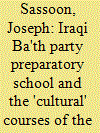

|
|
|
|
|
| Publication |
2014.
|
| Summary/Abstract |
Political indoctrination of the Ba'th party cadre in Iraq was critical for the durability of the regime for 35 years. The party preparatory school was the vehicle for the ideological training of the party elite, while special courses, provided by the party branches, focused on the 'cultural' education of the party's lower echelons to prepare them for becoming active members. Using the Ba'th's own archives, the article examines how the party's school, the branches' cultural courses, and the Ba'th cultural activities, combined to create an ideologically educated cadre which paved the way for the party's domination of Iraq's culture and ideology.
|
|
|
|
|
|
|
|
|
|
|
|
|
|
|
|
| 6 |
ID:
128214
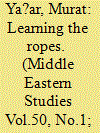

|
|
|
|
|
| Publication |
2014.
|
| Summary/Abstract |
This article analyses the topoi of the Young Turk reading of the 1905 Russian Revolution. It argues that the Young Turks considered the 1905 Revolution as a victory against autocratic regimes and as an edificatory example for the Ottoman constitutionalists. This example provided the Young Turks with a mirror in which they saw a model of revolution from below. As such, in addition to encouraging the Young Turks to formulate and re-assess their methods and means of establishing a constitutional regime in the Ottoman Empire, the 1905 Revolution helped them to transform their initially intellectual movement to an effectual political one.
|
|
|
|
|
|
|
|
|
|
|
|
|
|
|
|
| 7 |
ID:
128212
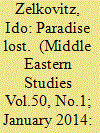

|
|
|
|
|
| Publication |
2014.
|
| Summary/Abstract |
The article discusses the evolution of the Palestinian community in Kuwait in the wake of the 1948 War. The demand for skilled labour facilitated the gradual integration of the Palestinians into Kuwaiti society, especially in the education system and state institutions. In this regard the article examines the role of education and students in creating personal and political socio-economic networks. The relatively liberal political atmosphere in Kuwait during its years of development transformed it into a hotbed for Palestinian political activism. This trend continued up to the 1991 Gulf War, when Yasir Arafat's support of Saddam Husayn in that wa, caused the fall from grace of the Palestinians in Kuwait. This ended the central role that the Palestinians played in the historical process of Kuwait state building. Following the death of Arafat the PLO began to seek reconciliation with Kuwait. At this timely moment in the history of relations between these two communities, the article sheds light on these efforts.
|
|
|
|
|
|
|
|
|
|
|
|
|
|
|
|
| 8 |
ID:
128210
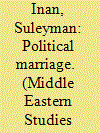

|
|
|
|
|
| Publication |
2014.
|
| Summary/Abstract |
Under the influence of popular history, recent historiography on the Ottomans has focused mainly on such subjects as the influence of women on politics and indirectly on issues of the harem. However, such a focus indicates limited information and an insufficient number of studies on the sons-in-law in the dynasty of the late Ottoman state. The purpose of this article is to develop a theoretical framework concerning sons-in-law in the dynasty of the late Ottoman state period by collating the related but limited references in the historical sources. In this context, such issues as the policy of marriage in the Ottoman dynasty, the status of the dynasty sons-in-law, and the privileges they had are studied in terms of the late period of the Ottomans. Thus, the study's major purpose is to discuss the late Ottoman history in the light of such an important but ignored subject.
|
|
|
|
|
|
|
|
|
|
|
|
|
|
|
|
| 9 |
ID:
128207


|
|
|
|
|
| Publication |
2014.
|
| Summary/Abstract |
This paper examines the perspectives on international relations of a leading Islamist scholar, Sheikh Yusuf al-Qaradawi. The discussion of Qaradawi's views is organized around seven themes that feature prominently in his international relations discourse. The paper argues that Qaradawi's views are central to how Islamists conceptualize international relations; and that they intersect with the views of secular Arab nationalists, Third World and Western critics of the prevailing international order, as well as neoclassical and righteous realists. Finally, the paper sheds light on the centrality of the sacred text (the Qur'an) to the international relations discourse of Islamists, such as Qaradawi.
|
|
|
|
|
|
|
|
|
|
|
|
|
|
|
|
| 10 |
ID:
128209
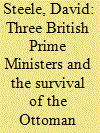

|
|
|
|
|
| Publication |
2014.
|
| Summary/Abstract |
Throughout the nineteenth century British statesmen had to concern themselves with the condition and prospects of the Ottoman Empire, both in Europe and the Near East. This article concentrates on the views and attitudes of Lord Palmerston, W.E. Gladstone, and the third Marquess of Salisbury, all of whom were in high office for over 30 years. Palmerston, who considered the Ottoman Empire an essential component in the balance of power, was the most Turcophile of the three. Gladstone attempted to bring into existence a Concert of Europe with authority to support the continued existence of the empire. Salisbury was prepared to contemplate an orderly dismemberment of it, in such a way as to reduce rivalry between the greater powers.
|
|
|
|
|
|
|
|
|
|
|
|
|
|
|
|
|
|
|
|
|